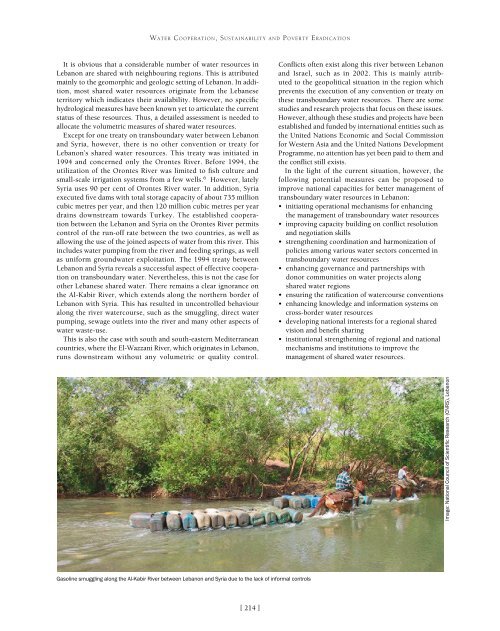Free Flow
oJhBl
oJhBl
You also want an ePaper? Increase the reach of your titles
YUMPU automatically turns print PDFs into web optimized ePapers that Google loves.
Water Cooperation, Sustainability and Poverty Eradication<br />
It is obvious that a considerable number of water resources in<br />
Lebanon are shared with neighbouring regions. This is attributed<br />
mainly to the geomorphic and geologic setting of Lebanon. In addition,<br />
most shared water resources originate from the Lebanese<br />
territory which indicates their availability. However, no specific<br />
hydrological measures have been known yet to articulate the current<br />
status of these resources. Thus, a detailed assessment is needed to<br />
allocate the volumetric measures of shared water resources.<br />
Except for one treaty on transboundary water between Lebanon<br />
and Syria, however, there is no other convention or treaty for<br />
Lebanon’s shared water resources. This treaty was initiated in<br />
1994 and concerned only the Orontes River. Before 1994, the<br />
utilization of the Orontes River was limited to fish culture and<br />
small-scale irrigation systems from a few wells. 6 However, lately<br />
Syria uses 90 per cent of Orontes River water. In addition, Syria<br />
executed five dams with total storage capacity of about 735 million<br />
cubic metres per year, and then 120 million cubic metres per year<br />
drains downstream towards Turkey. The established cooperation<br />
between the Lebanon and Syria on the Orontes River permits<br />
control of the run-off rate between the two countries, as well as<br />
allowing the use of the joined aspects of water from this river. This<br />
includes water pumping from the river and feeding springs, as well<br />
as uniform groundwater exploitation. The 1994 treaty between<br />
Lebanon and Syria reveals a successful aspect of effective cooperation<br />
on transboundary water. Nevertheless, this is not the case for<br />
other Lebanese shared water. There remains a clear ignorance on<br />
the Al-Kabir River, which extends along the northern border of<br />
Lebanon with Syria. This has resulted in uncontrolled behaviour<br />
along the river watercourse, such as the smuggling, direct water<br />
pumping, sewage outlets into the river and many other aspects of<br />
water waste-use.<br />
This is also the case with south and south-eastern Mediterranean<br />
countries, where the El-Wazzani River, which originates in Lebanon,<br />
runs downstream without any volumetric or quality control.<br />
Conflicts often exist along this river between Lebanon<br />
and Israel, such as in 2002. This is mainly attributed<br />
to the geopolitical situation in the region which<br />
prevents the execution of any convention or treaty on<br />
these transboundary water resources. There are some<br />
studies and research projects that focus on these issues.<br />
However, although these studies and projects have been<br />
established and funded by international entities such as<br />
the United Nations Economic and Social Commission<br />
for Western Asia and the United Nations Development<br />
Programme, no attention has yet been paid to them and<br />
the conflict still exists.<br />
In the light of the current situation, however, the<br />
following potential measures can be proposed to<br />
improve national capacities for better management of<br />
transboundary water resources in Lebanon:<br />
• initiating operational mechanisms for enhancing<br />
the management of transboundary water resources<br />
• improving capacity building on conflict resolution<br />
and negotiation skills<br />
• strengthening coordination and harmonization of<br />
policies among various water sectors concerned in<br />
transboundary water resources<br />
• enhancing governance and partnerships with<br />
donor communities on water projects along<br />
shared water regions<br />
• ensuring the ratification of watercourse conventions<br />
• enhancing knowledge and information systems on<br />
cross-border water resources<br />
• developing national interests for a regional shared<br />
vision and benefit sharing<br />
• institutional strengthening of regional and national<br />
mechanisms and institutions to improve the<br />
management of shared water resources.<br />
Image: National Council of Scientific Research (CNRS), Lebanon<br />
Gasoline smuggling along the Al-Kabir River between Lebanon and Syria due to the lack of informal controls<br />
[ 214 ]


